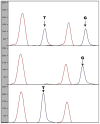Genetic variants in germline TP53 and MDM2 SNP309 are not associated with early onset colorectal cancer
- PMID: 18381604
- PMCID: PMC4381874
- DOI: 10.1002/jso.20996
Genetic variants in germline TP53 and MDM2 SNP309 are not associated with early onset colorectal cancer
Abstract
Background and objectives: Colorectal cancer (CRC) arising in patients under age 30 is a rare disease, and few cases have been reported within Li-Fraumeni kindreds. To determine how often alterations in the p53 pathway genes contribute to disease susceptibility, we have evaluated patients with early onset CRC for the presence of germline variants in the p53 gene and MDM2 SNP309.
Methods: Thirty-five patients with CRC diagnosed before age 30 were included in this study-based on tissue availability. DNA samples from peripheral blood leukocytes were analyzed for constitutional mutations and polymorphisms in p53 as well as polymorphisms in MDM2 SNP309.
Results: No mutations were found in exons 4-10 of the p53 gene. The frequencies of polymorphisms in p53 and in MDM2 SNP309 did not differ from rates previously reported for normal control populations, and no polymorphism in either gene could be associated with early onset CRC.
Conclusions: Neither germline variants in p53 nor MDM2 SNP309 play an underlying role in the development of very early onset CRC. For the large majority of cases, the genetic basis of this disease remains unknown.
Figures


Similar articles
-
Evaluation of TP53 Pro72Arg and MDM2 SNP285-SNP309 polymorphisms in an Italian cohort of LFS suggestive patients lacking identifiable TP53 germline mutations.Fam Cancer. 2016 Oct;15(4):635-43. doi: 10.1007/s10689-016-9895-3. Fam Cancer. 2016. PMID: 26956143
-
TP53 Arg 72Pro and MDM2 SNP309 polymorphisms and colorectal cancer risk: a west Algerian population study.Pathol Oncol Res. 2015 Jul;21(3):629-35. doi: 10.1007/s12253-014-9867-6. Epub 2014 Dec 24. Pathol Oncol Res. 2015. PMID: 25537146
-
MDM2 SNP309 T>G alone or in combination with the TP53 R72P polymorphism does not appear to influence disease expression and age of diagnosis of colorectal cancer in HNPCC patients.Int J Cancer. 2007 Feb 1;120(3):563-5. doi: 10.1002/ijc.22339. Int J Cancer. 2007. PMID: 17096342
-
Genetic polymorphisms of TP53 (rs1042522) and MDM2 (rs2279744) and colorectal cancer risk: An updated meta-analysis based on 59 case-control studies.Gene. 2020 Apr 15;734:144391. doi: 10.1016/j.gene.2020.144391. Epub 2020 Jan 27. Gene. 2020. PMID: 32001373 Review.
-
Effects of the MDM2 promoter SNP285 and SNP309 on Sp1 transcription factor binding and cancer risk.Transcription. 2011 Sep-Oct;2(5):207-10. doi: 10.4161/trns.2.5.16813. Transcription. 2011. PMID: 22231115 Free PMC article. Review.
Cited by
-
The association between the TP53 Arg72Pro polymorphism and colorectal cancer: An updated meta-analysis based on 32 studies.Oncotarget. 2017 Jan 3;8(1):1156-1165. doi: 10.18632/oncotarget.13589. Oncotarget. 2017. PMID: 27901479 Free PMC article.
-
Dominantly Inherited Hereditary Nonpolyposis Colorectal Cancer Not Caused by MMR Genes.J Clin Med. 2020 Jun 23;9(6):1954. doi: 10.3390/jcm9061954. J Clin Med. 2020. PMID: 32585810 Free PMC article. Review.
-
An updated meta-analysis on the association of MDM2 SNP309 polymorphism with colorectal cancer risk.PLoS One. 2013 Sep 30;8(9):e76031. doi: 10.1371/journal.pone.0076031. eCollection 2013. PLoS One. 2013. PMID: 24098760 Free PMC article.
-
A high-frequency regulatory polymorphism in the p53 pathway accelerates tumor development.Cancer Cell. 2010 Sep 14;18(3):220-30. doi: 10.1016/j.ccr.2010.07.010. Cancer Cell. 2010. PMID: 20832750 Free PMC article.
-
DNA sequence profiles of the colorectal cancer critical gene set KRAS-BRAF-PIK3CA-PTEN-TP53 related to age at disease onset.PLoS One. 2010 Nov 12;5(11):e13978. doi: 10.1371/journal.pone.0013978. PLoS One. 2010. PMID: 21103049 Free PMC article.
References
-
- Aaltonen LA, Peltomaki P, Leach FS, et al. Clues to the pathogenesis of familial colorectal cancer. Science. 1993;260:812–816. - PubMed
-
- Fishel R, Lescoe MK, Rao MR, et al. The human mutator gene homolog MSH2 and its association with hereditary nonpolyposis colon cancer. Cell. 1994;77:167. - PubMed
-
- Groden J, Thliveris A, Samowitz W, et al. Identification and characterization of the familial adenomatous polyposis coli gene. Cell. 1991;66:589–600. - PubMed
Publication types
MeSH terms
Substances
Grants and funding
LinkOut - more resources
Full Text Sources
Medical
Research Materials
Miscellaneous

